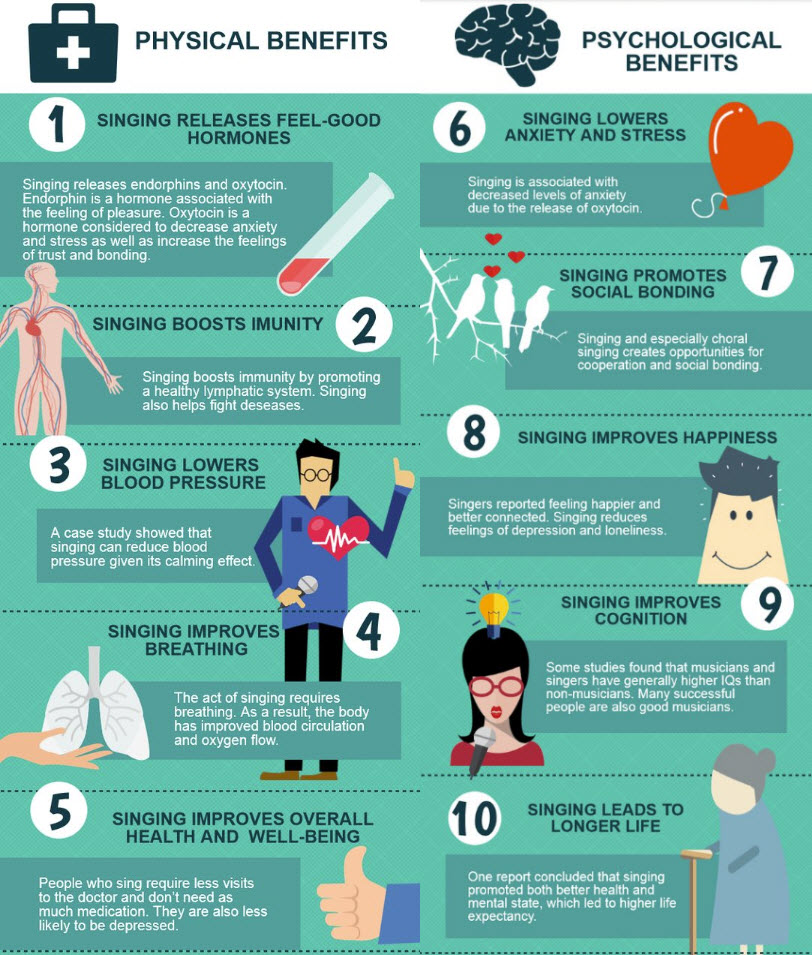What is meant by wellbeing?
Wellbeing is a state of happiness and contentment, with low levels of distress, overall good physical and mental health and outlook, or good quality of life. If you want to be healthy, wellbeing is a crucial part of this, as your level of contentedness really affects whether you will be free of physical and mental health conditions or not.
How can singing help with wellbeing?
Singing, especially group singing, is fantastic for you! It is now being discovered that people who sing regularly are happier, healthier and live longer than non-singers. Singing is very physical and helps to improve lung health. Group singing has been scientifically proven to lower stress (lowering cortisol production), relieve anxiety, and elevate endorphins. It is energising and calming at the same time. Amazingly, the ‘love’ hormone, ‘oxytocin’, which helps people bond with one another, is released during group singing. It is also reported that heart beats also synch up when people sing together! You can read more about the fantastic benefits of group singing in Time Magazine
Is wellness all about the individual?
No! Global Harmonies believes that wellness in the individual is intrinsically linked to wellness of the community, society and the planet. Global Harmonies promotes inclusion, diversity awareness, social justice and Earth care and many of the songs and chants we sing reflect these values.
How does Global Harmonies facilitate Singing for Wellbeing?
Global Harmonies sessions deliberately include various elements so as to really help participants connect to their breathe and bodies, experience less anxiety about how they sound and maximise the health and wellness potential of singing. Firstly, the focus is never on talent, performance or competition. It is always on the fun and joy of singing and all the benefits that go with it. Sessions are inclusive and friendly and trauma informed. Participants come from many backgrounds and many participants experience chronic health conditions, anxiety, trauma, mental health challenges and all are welcome. Other elements which are brought it to make sure people go away feeling really energised and positive are the following:
- gentle embodiment work/warm ups which can include yoga-inspired stretches, acupressure points for opening the voice, tai chi or chi gung sequences or vagus nerve soothing exercises such as self-havening. Rachel is trained as a holistic wellness tutor in the Capacitar tradition, so is skilled at teaching these simple exercises.
- vocal warm-ups, especially humming and toning on vowel sounds, which allow deep relaxation and a safe way to prepare the vocal chords for singing
- learning abdominal breathing, which is really important for singing and for general health
- mindful moments such as silence after a song or chant to notice the physical and energetic effect of the sounds in the body
- inspiring songs and chants which work as positive affirmations, such as ‘fire, fire in my soul’ or ‘I am a tower of strength without and within’
- chants from various world faith traditions which bring about a state of deep calm and relaxation
- exercises from the voice healing tradition, learnt by Rachel during her research for her Ethnomusicology Masters dissertation in Voice and Healing. Rachel worked with many renowned voice healing facilitators including Chloe Goodchild, Jill Purce and James D’Angelo. These include toning, over-tone chanting, clearing the chakras (energies in the body) through the voice, laughter rituals and more.
- an awareness of the effects of trauma and how it might influence participation and needs during a session. Rachel has worked with trauma survivors and has many years of experience working in community settings, and has a broad understanding of participant-centered facilitation.
See here for details of next workshop/course.

